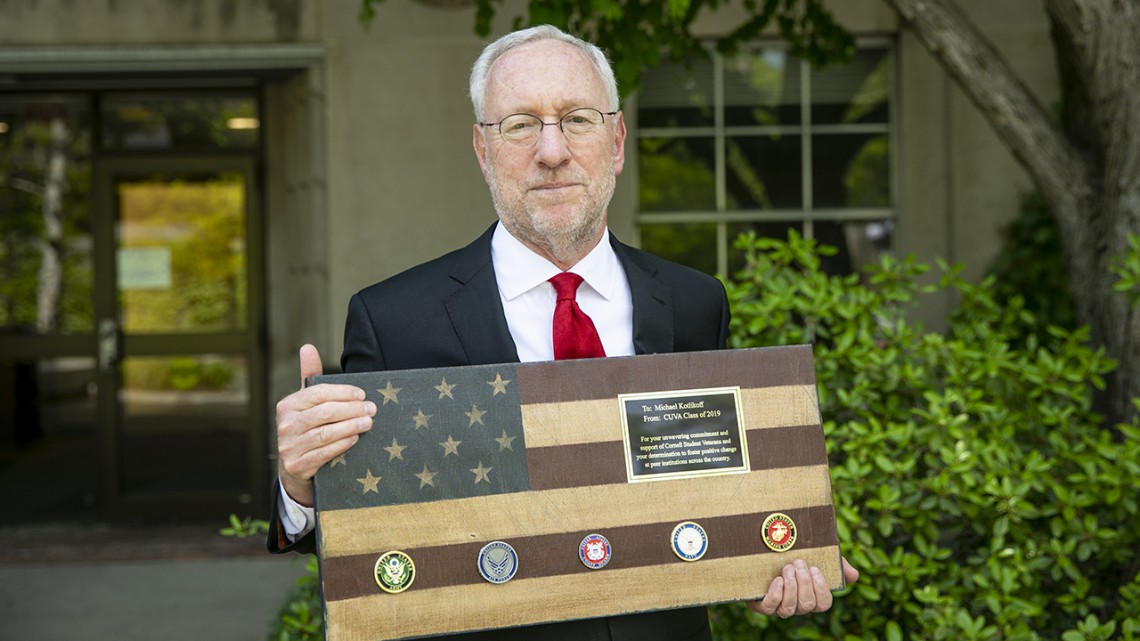
Provost Michael Kotlikoff holds a plaque given to him by the Cornell Undergraduate Veterans Association Class of 2019 in recognition of his support of student veterans at Cornell and peer institutions.
Kotlikoff appointed to second term as Cornell provost
By Daniel Aloi
Michael I. Kotlikoff, Cornell’s 16th provost, has been appointed to a second term. His reappointment, effective July 1, 2020, was approved May 25 by the Cornell University Board of Trustees.
“Mike has advanced multiple key initiatives at Cornell with vision, creativity and dedication,” President Martha E. Pollack said. “The long-term success of the university and its academic excellence have been his first priority in every leadership decision, and for that we are extremely grateful.”
Cornell has seen landmark changes during Kotlikoff’s first term, with the opening of the Cornell Tech campus on Roosevelt Island in New York City and the creation of the Cornell SC Johnson College of Business. As provost, he has created a strategic reserve for university excellence through key investments in faculty recruitment and retention, the student experience, and One Cornell.
Kotlikoff expanded funding for recruitment of diverse faculty and for spousal hires while hiring the next generation of leadership, including academic deans, associate and vice provosts, and new positions such as vice provosts for enrollment and for academic integration.
He launched the “Radical Collaboration Drives Discovery” initiative, which supports research in eight strategic areas that cross disciplines and bridge the Ithaca and New York City campuses. He also established multicollege departments in statistics and data science and in computational biology, and created the Provost Research Innovation Awards.
Initiatives such as Gateway Courses and the Center for Teaching Innovation have impacted the student experience. Kotlikoff also has been a leading proponent of the North Campus Residential Expansion, which would allow Cornell to house all of its first-year and sophomore students on campus.
One Cornell efforts have included creating the Academic Integration Initiative; bringing together offices for more than a dozen Cornell units in the university’s New York City hub at 570 Lexington Ave.; and providing housing at Cornell Tech for faculty members shuttling between Ithaca and Roosevelt Island.
Kotlikoff spearheaded a review of the social sciences on campus, realigned the Office of the Vice Provost for Research for greater focus on entrepreneurship and intellectual property creation, and helped establish a Research Committee of the board of trustees to raise the profile of research at Cornell.
He worked to eliminate a central deficit in the operating budget and developed a 10-year budget to streamline planning and enable planned investments; and lowered both the draw on the endowment and expected tuition increases.
Among its investments in facilities, the Office of the Provost established a fund for academic and nonacademic facilities renovation, and helped develop a plan for long-term investment in university infrastructure. The plan includes a $250 million undergraduate residence hall project, ensuring an adequate deferred maintenance plan, and planning priorities for academic facilities.
Kotlikoff’s office also has undertaken a strategic review of administrative services – such as admissions, human resources and communications – and contributed to updates of university policy on research misconduct, tenure, consensual relationships, harassment and employee conduct.
This year has seen the creation of a multicollege Cornell Center for Immunology, and the Institute of Politics and Global Affairs, opening in the 2019-20 academic year. Kotlikoff has also championed the recruitment of service veterans to Cornell and other Ivy League universities, highlighting the limited enrollment of these students in elite universities.
“The past four years have been the most challenging and rewarding of my career,” Kotlikoff said. “Cornell’s extraordinary community of scholars is dedicated to solving the issues facing the world, educating the leaders of tomorrow and bettering people’s lives. I am honored to help further our mission.”
Kotlikoff is a professor of molecular physiology. He has maintained an internationally recognized research program working on lung and vascular biology, and heart repair, continually funded by the NIH for the past 35 years, and has trained multiple Cornell graduate and undergraduate students. His laboratory uses mouse genetics and recombination to understand the limited ability of heart cells to grow and divide following injury.
Before being named provost in 2015, Kotlikoff served as the Austin O. Hooey Dean of Veterinary Medicine. He was appointed to the deanship in 2007 and reappointed in 2011 for a second term starting in 2012.
In early 2016, he served as acting president (in addition to his provost role) while then-President Elizabeth Garrett was being treated for cancer. Garrett died in March of 2016.
Kotlikoff joined Cornell in 2000 from the University of Pennsylvania, where he was chair of the Department of Animal Biology. He earned his B.A. (comparative literature) and V.M.D. degrees from Penn, graduating first in his class, and received a fellowship to the University of California, Davis, where he earned his Ph.D. in physiology in 1984.
Media Contact
Get Cornell news delivered right to your inbox.
Subscribe
